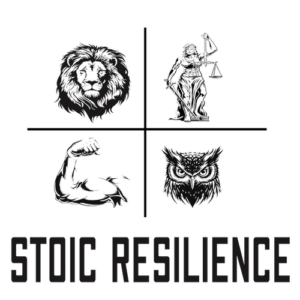Frequently Asked Questions
What is Stoic Resilience Coaching, Training, and Consulting?
Stoic Resilience Coaching, Training, and Consulting is a comprehensive approach to personal and professional development that draws on the philosophy of Stoicism to help individuals and organizations build resilience, cultivate a calm and rational mindset, and find meaning and purpose in difficult situations. Our approach combines cognitive-behavioral techniques, mindfulness practices, and philosophical teachings to help individuals develop a greater sense of control and perspective over their thoughts and emotions.
How can Stoic Resilience Coaching, Training, and Consulting benefit me or my organization?
Our approach can benefit you or your organization by helping you develop the tools and techniques to navigate life’s challenges more quickly and confidently. Whether you want to overcome personal challenges, enhance your leadership skills, improve team dynamics, or adapt to change, our approach can help you build resilience and cultivate a calm and rational mindset.
What does Stoic Resilience Coaching, Training, and Consulting involve?
Our approach involves a combination of coaching, training, and consulting services tailored to meet the specific needs of each individual or organization. Our services include one-on-one coaching sessions, group training workshops, and business-focused consulting services designed to help individuals and organizations build resilience, adapt to change, and achieve their goals.
How does Stoic Resilience Coaching, Training, and Consulting differ from other coaching and training programs?
Our approach is unique in that it draws on the philosophy of Stoicism to help individuals build resilience and cultivate a calm and rational mindset. This approach provides a unique perspective and tools to help individuals and organizations navigate challenges more quickly and confidently.
How long does Stoic Resilience Coaching, Training, and Consulting take?
The length of our coaching, training, and consulting programs can vary depending on the specific needs of each individual or organization. We offer one-on-one coaching sessions that can be scheduled on a weekly or bi-weekly basis, as well as group training workshops that can be completed in a single session or over multiple sessions. Our consulting services are tailored to meet the specific needs of each organization and may involve a longer-term engagement.
How can I or my organization get started with Stoic Resilience Coaching, Training, and Consulting?
To get started with our coaching, training, and consulting services, contact us to schedule a consultation. We will work with you to assess your needs and develop a customized plan that meets your specific needs. Whether you are an individual looking for personal coaching or an organization looking for business-focused consulting services, we can help you build resilience and cultivate a calm and rational mindset.
What is Stoic Resilience?
Does Resilience work with Stoicism?
What does Marcus Aurelius say about resilience?
What is the difference between Resilience and Stoicism?
Resilience and Stoicism are related concepts but differ in their focus and scope.
Resilience is a broader concept that encompasses various psychological and behavioral factors contributing to one’s ability to cope with and overcome difficulties. Resilience refers to the ability to adapt, recover, and bounce back from adversity or difficult situations. It involves maintaining a positive mindset, emotional strength, and the capacity to persevere through challenges.
On the other hand, Stoicism is a philosophical school of thought that originated in ancient Greece and Rome. It offers specific principles and practices to guide individuals in living a virtuous and fulfilling life. Stoicism emphasizes developing inner strength, accepting what cannot be controlled, and focusing on personal attitudes and responses to events.
While resilience can be seen as a psychological trait or capacity, Stoicism provides a philosophical framework that helps individuals cultivate resilience. Stoicism guides navigating adversity by developing emotional resilience, maintaining a balanced perspective, and focusing on what is within one’s control.
In summary, resilience is a broader concept encompassing psychological and behavioral aspects related to bouncing back from challenges. Stoicism can be seen as a tool or approach within the overall concept of resilience. At the same time, Stoicism is a philosophical system that offers specific principles and practices to cultivate resilience and guide one’s attitudes and responses to adversity.
What are the four ideals of Stoicism?
Stoicism encompasses several vital ideals that are central to its philosophy. While there are multiple principles and concepts within Stoicism, the following four ideals capture some of its core teachings:
- Wisdom (Sophia): Wisdom is considered the highest virtue in Stoicism. It involves seeking knowledge, understanding, and insight into the nature of the world and oneself. Wisdom enables individuals to discern what is within their control and what is not, guiding them to make rational and virtuous choices.
- Courage (Andreia): Courage is facing and overcoming fear, adversity, and challenges. It involves accepting life’s inherent risks and uncertainties and embracing them with resolve. Stoicism emphasizes developing inner strength and the courage to act in accordance with one’s values, even in the face of difficulty.
- Justice (Dikaiosyne): Justice in Stoicism goes beyond the conventional notion of legal justice. It encompasses fairness, equity, and treating others with kindness and respect. Practicing justice involves acting virtuously towards others and contributing to the well-being of the larger community. Stoics believe in living in harmony with nature, which includes recognizing all human beings’ interconnectedness and inherent worth.
- Temperance (Sophrosyne): Temperance refers to self-control, moderation, and restraint. It involves cultivating discipline over one’s desires, impulses, and attachments. Stoics emphasize the importance of living in harmony with nature and avoiding excesses. By practicing temperance, individuals can achieve inner tranquility and avoid being controlled by external or fleeting desires.
These four ideals—wisdom, courage, justice, and temperance—form the foundation of Stoicism and guide individuals in leading a virtuous and fulfilled life. Stoics strive to develop these virtues, believing they lead to inner peace, resilience, and a harmonious relationship with oneself and the world.
Is Stoicism mentally healthy?
Stoicism has the potential to promote mental health and well-being, although the impact may vary from person to person. By cultivating emotional resilience, accepting the uncontrollable, engaging in rational thinking, developing resilience, and practicing gratitude and mindfulness, Stoicism offers tools for managing emotions, reducing anxiety, gaining perspective, and fostering resilience. However, it’s important to remember that individual needs and preferences differ, and seeking professional guidance is recommended for those facing significant mental health challenges or seeking a personalized approach to their well-being.
If You still have questions, I have answers.

